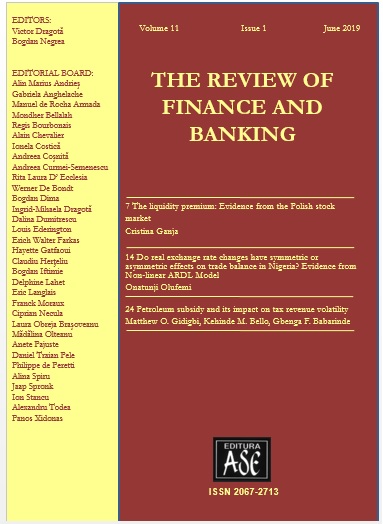Petroleum subsidy and its impact on tax revenue volatility
Petroleum subsidy and its impact on tax revenue volatility
Author(s): Matthew Gidigbi, Kehinde Bello, Gbenga BabarindeSubject(s): Economy, National Economy, Energy and Environmental Studies, Public Finances
Published by: EDITURA ASE
Keywords: Petroleum; Subsidy; Tax Revenue; Volatility; Exchange Rate; ARCH and GARCH;
Summary/Abstract: Energy pricing did not only have an implication on the indigent but on the national government as well. Petroleum subsidy tolerance impacts the government revenue of certainty but the extent of its impact needs to be determined. Therefore, it becomes imperative to assess the contribution of the petroleum subsidy on tax volatility. Data were sourced from the NNPC Annual Statistical Bulletin (ASB) for the year 1997, 2005, 2008 and 2016; Central Bank of Nigeria (CBN) Statistical Bulletin and Statement of Accounts and Annual Reports. An exploratory analysis was conducted on extracted data to generate other variables of interest such as subsidy on premium motor spirit, tax revenue volatility before proceeding to Lease Squares analyses. ARCH and GARCH models were applied to ascertain the volatility of tax revenue. Petroleum subsidy positively impacts tax revenue volatility; the impact was minimal but statistically significant at 1 per cent significance level. Exchange rate increased the tax revenue volatility by 5.10 point in the long-run, likewise gross domestic savings by 0.4 point in the long-run and both estimates were statistically significant at 1 per cent respectively. Both government expenditure and gross fixed capital formation reduced the tax revenue volatility at 0.05 and 0.03 point respectively and the estimates were statistically significant at 10 per cent and 1 per cent. The ECM showed that any deviation in the estimates would be restored within a year and this is statistically significant at 1 per cent. It was therefore recommended that the government should do more to manage and maintain appropriate exchange rate policy and keep up improving on its expenditure towards capital formation and investment in order to manage tax revenue volatility.
Journal: The Review of Finance and Banking
- Issue Year: 11/2019
- Issue No: 1
- Page Range: 24-36
- Page Count: 13
- Language: English

